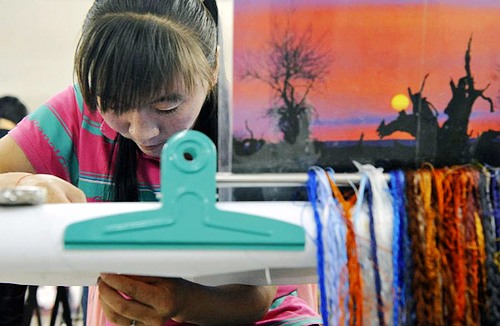
A Chinese worker hunches over a sewing machine, making made-in-China products. (Photo/Xinhua)
The Bitter Blessing
For the past decade, "Made in China" has driven China's economic engine forward, and made a big share of interests for the world in the meantime. Yet, what frequently appeared in the mainstream Western media were mainly the exaggerated quality issues of Chinese-made products, and the image of "Made in China" was often perceived as cheap and low-end. The bitter side of the "Chinese blessing" has remained unmentioned.
On a gloomy day in August 2007, in Foshan, Guangdong province, China, a middle-aged Chinese man was found dead after hanging himself on the third floor of a warehouse. Next to his body were a pile of cute Sesame Street dolls.
The man was Cheung Shu-hung, a Hong Kong resident and co-owner of Foshan-based Lee Der Industrial Co. Nine days before Cheung committed suicide, Mattel Inc., one of the largest U.S. toy companies, and the U.S. Consumer Product Safety Commission announced a recall of 967,000 plastic toys made by Lee Der because they were allegedly decorated with paint found to have excessive amounts of lead which would have harsh impact on children's brain development. Prior to the recall, Lee Der was the second largest toy maker in the city. The company was forced to temporarily shut down, leaving 2,500 workers out of work. Under such heavy pressure, Cheung had no choice, but to hang himself.
After Cheung's suicide, investigations were immediately carried out by China's Ministry of Commerce. Ironically, the investigation revealed that the vast majority of the toys recalled were the result of a sudden change in the U.S. safety standard and the dealer's risk transfer, not through a manufacturing flaw in the Chinese manufacturer. Under heavy public opinion pressure, Mattel Inc. apologized to China for the recall over a month later.
After the bitter story comes the bitter memory.
Li Shengjiao, was a senior Chinese diplomat who spent most of his 40-year career overseas and commuted between China and Western countries. He knew made-in-China stuff just as he knew his stuff.
"In those days, the products China exported to the Western countries were mostly the country's best available, but those remained for domestic use were comparatively inferior ones," Mr. Li recalled.
"Chinese people saved the best for the West."
The "bitter blessing" is not over yet. After the bitter memory comes the bitter number.
A made-in-China official mascot for the 2012 Olympics was priced at £20 in London. However, on the other side of the world in China, the Chinese workers hunched in rows over sewing machines can only get as little as £0.18 from one cuddly toy.
The world famous Barbie dolls sold in more than 100 countries were mainly manufactured in China. For each Barbie sold in America for $9.9, there is merely $0.35 left to her Chinese "mother" for labor, plant & equipment and electricity.
These are merely two of the many cases, in which China was pushed to the limit.
Looking ahead, will the bitter number change for the better? Will "Made in China" made it?

Copyright ©1999-2011 Chinanews.com. All rights reserved.
Reproduction in whole or in part without permission is prohibited.